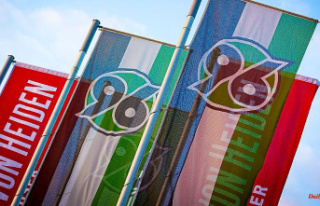Vladimir Putin likes beautiful watches. In the past, expensive models from Switzerland often adorned his wrists, but those times are over since the Russian attack on Ukraine. Presumably to support his government's new economic program, a local clock now tells the time.
Russia's president is demonstratively promoting the domestic economy: According to media reports, Vladimir Putin has recently started wearing a wristwatch made in Russia instead of a Swiss watch. It therefore comes from the Imperial Peterhof Factory brand of the Russian manufacturer Raketa.
According to the online newspaper gazeta.ru, the watch will cost 1.5 million rubles, or around 24,000 euros. Accordingly, the President's watch is an exclusive one-off: The black onyx used for the bezel should therefore only be available for purchase by Putin and not by other customers.
Since the Russian attack on Ukraine at the end of February, the country has been subject to extensive sanctions. Many international companies also withdrew from Russia. Many goods and products can therefore no longer be manufactured and delivered. However, Moscow repeatedly emphasizes that it will survive the punitive measures - and even emerge stronger from them.
According to "Kommersant", the head of the Kremlin has often worn models from Swiss manufacturers Blancpain or IWC. "Not noticing the difference is like confusing the president's former Mercedes-Benz Pullman Guard with his current Aurus Senat sedan," reads an op-ed in the Russian daily, which first reported on the new watch on Putin's wrist .
The journalists explain the switch to the Russian model with the role model function of the Russian president: Putin wants to set a good example and demonstrate his personal commitment to his government's import substitution program. This provides for the Russian economy to produce as many components, goods and products that are missing due to western sanctions as possible. However, the vast majority of economists do not believe in success because of the close interdependencies of the global economy. They believe that reverse industrialization with lower quality for a higher price is the most likely scenario.












